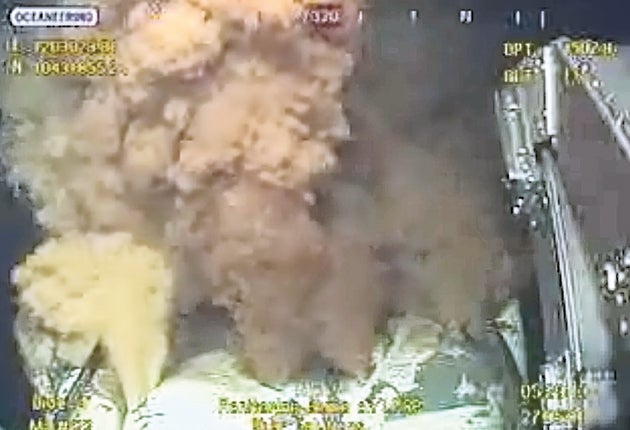David Usborne: All eyes on the plume in BP's crisis centre
Our writer feels the tension boil as executives in Houston endure an <i>Apollo 13</i> moment

The champagne was not popping at BP's command centre in Houston yesterday. Neck veins maybe. Roughly a third of the oil giant's top executives, including the CEO, Anthony Hayward, sat alongside the US Energy Secretary, Stephen Chu, watching, waiting and trying to breathe.
"There is a lot of adrenalin in there, it is extraordinarily intense," says Bob Dudley, the firm's managing director, who ducks out to speak to the sole print journalist let into the building on this morning of especially high stakes.
Nothing is static or boring inside that room, a sort of Mission Control as, in the Gulf of Mexico, BP suffers the equivalent of what befell Apollo 13. On one side of the room, live video is projected on to the walls showing the scene on the sea floor at the site of the sunken rig itself. Robotic submarines shine lights and roam. Eyes are focused mostly on the plume. At the moment it is spewing the mud that is being forced into the well as part of the top kill, and not the darker oil and gas we were seeing before.
But the real drama is on the opposite wall, hung with banks of flat-screen monitors showing the competing pressures of the mud that is being driven in and the oil from below that is trying to defeat it and leak out. When the mud – being pumped with 30,000 horsepower from ships above – is winning the battle, the executives in the room allow themselves momentarily to relax. But then the vital signs go into reverse and it is the mud that is again on the retreat. Everyone along the banks of chairs and desks grows tense again.
It has already been a five-week haul for everyone at the command centre. Carpeting has been trodden into smudged submission. Posters pinned to a wall displaying a letter of thanks to everyone involved from Mr Hayward are curling at the corners.
There are about 600 people on the job here, although most are shut away behind closed doors. Some emerge, sporting sleeveless blue jackets, identifying their very tightly defined roles: Litigations Supervisor, Incident Commander, Documentation Officer.
Many of them come here to work 12-hour shifts. Food is brought in – lots of chocolate-chip biscuits under clingfilm – and a massage therapist is on hand for those with knots in their spines. "They are an incredible group of professionals," Mr Dudley says.
Upstairs, in the public relations department, they are rushed off their feet. "And I used to think I had been hired to get BP into the newspaper," one spokesman sighs. Hundreds of calls come in every day, not just from the media – about 10,000 would-be deep marine inventors have called up so far with ideas – mostly crackpot – for stopping the leak.
Even in this tense hub, levity is allowed occasionally. Don't call it giggling at a funeral, because no one here thinks it has got to that point yet. But jokes about what better befits the firm's name have been doing the rounds here for weeks. Bayou Polluter is the most common. Beyond Petroleum just seems so unfortunate right now, Big Pickle very apt.
It has been five weeks since those dread words came to Houston from the well: we have a problem. It may be a day or two more before we know whether the men and women from this command centre can declare an underwater victory and return to their normal day jobs.
Join our commenting forum
Join thought-provoking conversations, follow other Independent readers and see their replies
Comments
Bookmark popover
Removed from bookmarks